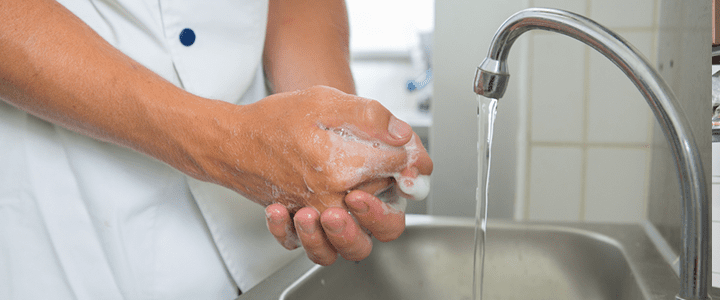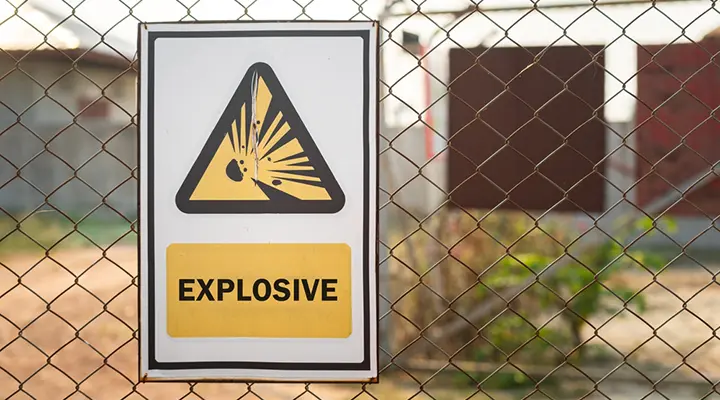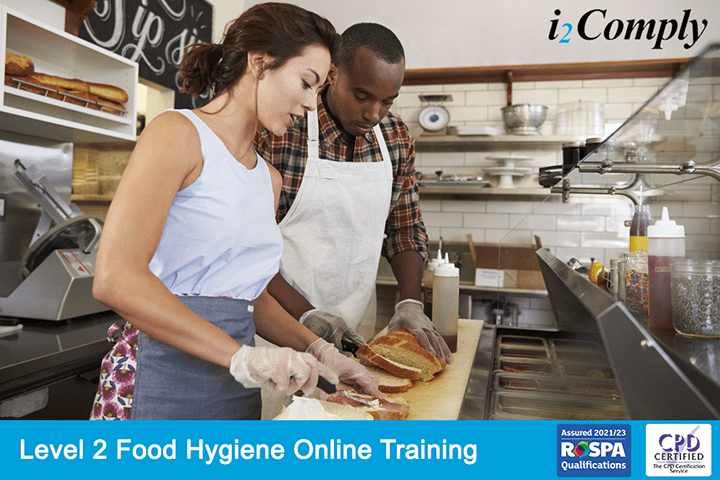Why is Food Safety and Hygiene training important? According to the Food Standards Agency, there are 2.4 million cases of foodborne illness per year in the UK. Also, around 180 people die in the UK from foodborne diseases every year.
Food hygiene and safety training provides employees with a thorough understanding of safe food preparation and serving practices. As a result, they can work safely and protect customers from health risks of contaminated food.
What is food safety?
Food safety refers to all essential practices that businesses must follow when processing, preparing, handling, storing and distributing food. Food safety measures reduce the risk of contamination and prevent foodborne illness or food-related injuries.
A variety of contaminants in food can cause harm to a consumer:
- Biological contaminants such as bacteria, viruses, moulds and parasites.
- Physical contaminants such as glass, screws and hair.
- Chemical contaminants such as pesticides and cleaning chemicals.
- Allergenic contaminants such as peanuts, milk and eggs.
Our RoSPA-assured online Food Hygiene training courses ensures staff who handle and prepare food have a knowledge of food hygiene so they can work safely.
The Food Safety and Hygiene (England) Regulations 2013 requires all food handlers to be trained in accordance with their food work activity. Therefore, all food businesses must ensure that staff whose role involves handling or preparing food receive the appropriate training in food hygiene.
What are the 4 Cs of food hygiene?

The 4 Cs of food hygiene are the four basic principles of food hygiene and safety practices. The are cleaning, cooking, chilling and cross-contamination. You can use the 4 Cs to keep food safe to eat and prevent foodborne illness.
1. Cleaning
Effective cleaning helps to prevent bacteria from spreading on food. When handling and preparing food, bacteria and other contaminating substances can spread via hands, equipment, food and surfaces. Staff who work with food must wash their hands properly, before handling any food, and after handling raw food. They must use appropriate products to clean and sanitise equipment and surfaces between tasks, especially after handling raw meat. Food handlers must wash fruits and vegetables, but not meat, poultry, eggs or seafood. Also, staff must always keep the kitchen area clean and clutter free. Failure to clean thoroughly is one of the most common reasons why food businesses face prosecution.
2. Cooking
Thorough cooking kills harmful bacteria in food. Staff must cook food at the right temperature and for the correct length of time to kill the bacteria that can make people sick. Food handlers should use a food thermometer to ensure that cooked food is at a right temperature and safe to eat. If they are not serving food straight away, they must keep it out of the temperature danger zone where bacteria grow most rapidly. They could use a heat source such as a slow cooker, chafing dish or preheated warming tray to keep food at a safe temperature.
3. Chilling
Proper food chilling helps to stop harmful bacteria from growing. Since bacteria most rapidly multiplies between 8 °C and 60 °C, it is very important not to leave food standing around at room temperature. Anyone who handles food must follow storage instructions, only keep chilled foods at room temperature during preparation, put food that needs to be chilled in the fridge straight away and keep track of when food should be used or thrown away.
4. Cross-contamination
Cross-contamination is one of the most common causes of food poisoning. It occurs when bacteria spreads between food, surfaces, equipment or hands. Raw meat, poultry, seafood, and eggs can spread bacteria to ready-to-eat foods, so you should keep them separate. Staff who handle food must separate or thoroughly clean and disinfect equipment and surfaces after handling these products and wash their hands.
Also, staff who handle food must take great care to avoid cross-contamination of allergens. Cooking does not remove food allergens. Even a small allergen trace in food can cause an allergic reaction. It can severely affect a person’s health or even be fatal.
What are the legal requirements for food safety and hygiene?

Businesses that supply food or drinks must comply with food safety and hygiene legislation to prevent harm to customers’ health. They must follow proper practices when preparing, handling or selling food.
The Food Safety Act 1990
The Food Safety Act 1990 provides a framework for food legislation in relation to safety, quality and labelling.
Under the Food Safety Act 1990 a food business must ensure that:
- They do not treat or process food in a way that makes it harmful to eat.
- The food that they sell or serve is of the nature, substance and quality that a consumer would expect.
- Food is labelled correctly and is not described or advertised in a false or misleading way.
Food Hygiene Regulations 2006
The Food Hygiene Regulations 2006 requires food businesses to ensure that they perform their activities hygienically. This applies to any activities related to food handling, preparation, processing, packaging, storage, transportation and selling.
Under the Food Hygiene Regulations 2006 every food business must:
- Register with relevant authorities.
- Ensure that all members of staff who prepare or handle food have adequate training in food safety and hygiene and are supervised in the work they do.
- Implement, practise and maintain food safety system based on HACCP principles.
Food labelling rules 2014
The Food Labelling Rules 2014 require food businesses to provide their customers with accurate information about the food they produce, sell and serve. The food labelling must cover any allergens that food may contain.
Natasha’s Law
Natasha’s Law came into effect on 1st October 2021. It requires food businesses to provide full ingredient lists and allergen labelling on foods pre-packaged for direct sale on the premises. Food packaging must display name of the food and full ingredient list, emphasising allergenic ingredients in bold text, capitals or coloured text.
What are the benefits of Food Hygiene and Safety training?

Food hygiene training is a legal requirement. Anyone whose work involves food must receive proper supervision, instruction and training in food hygiene to be able to do their job safely. However, there are more reasons why businesses should ensure that their employees undertake food hygiene and safety training, including:
1. Prevent food related illness
Most food-borne illnesses occur from improper storage, undercooking, poor personal hygiene or contaminated food preparation surfaces or equipment. Therefore it is important for employees to understand how their behaviour and activities contribute to food hygiene and safety in the workplace. They need to be aware of what they can do to prevent harm to customers’ health.
2. Reduce food waste
Food safety training ensures that food handlers are aware of good food handling and storage practices to avoid food waste. This allows them to ensure good food quality, minimise waste, and save the business time and money.
3. Improve staff efficiency
Correct training and regular application of food safety principles improves employee efficiency. When staff know how to handle and store food, there are fewer errors, and customers get a higher level of service.
4. Promote positive workplace environment
When employees receive food hygiene and safety training, they feel confident and competent to complete their tasks. The training emphasises the importance of good practices and why food safety is essential. This means that employees understand why they should follow strict workplace policies regarding cleaning and handling food.
5. Build a positive business reputation
Training helps to maintain good food hygiene and safety standards and promote a positive business reputation. Customers will recognise that your food is safe and prepared in a clean and hygienic environment. Your business will receive more positive reviews, which will attract more customers and increase business profit.
Need Food Hygiene and Safety Training?
Food hygiene and safety training is essential for anyone whose work involves preparing or handling food. According to the Food Safety and Hygiene (England) Regulations 2013, all food handlers must be trained in accordance with their food work activity.
We offer the following online RoSPA assured and CPD certified Food Hygiene courses:
1 – Level 1 Food Hygiene and Safety Online Training
2 – Level 2 Food Hygiene and Safety Online Training
3 – Food Allergen Awareness Online Training
Need advice?
Have any questions you’d like to be answered? Get in touch with one of our specialists today. You can get in contact at 0333 577 5016 or sales@i2comply.com. Our team are always here to help and answer any questions.




